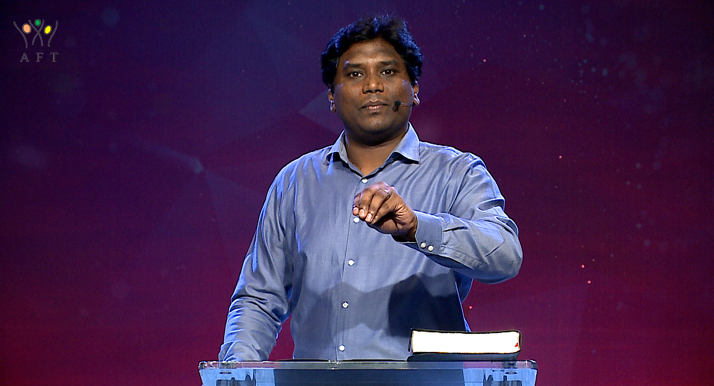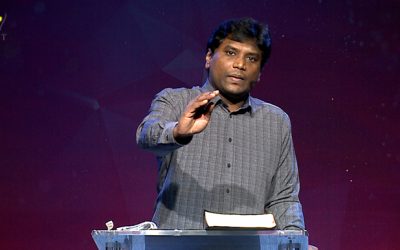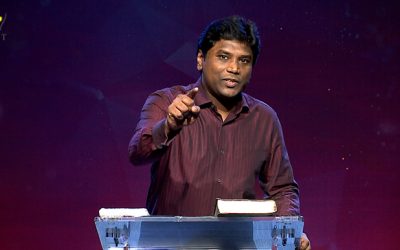
The Christian Way of Approaching Adversity (Part-13): Saved from the Greatest Danger
Sunday English Service – 06 JUN 21
Transcript
The greatest treasure that we have as believers, is our salvation. That’s what we saw last week, remember? You, if you’re a believer—I believe I’m speaking to believers, most of you—if you’re a believer, you have a great treasure. And that is your salvation. And, you know, the thing about this that, as I think about this, it gives me great hope because the last one year, the world has been turned upside down. All kinds of things happening, and pretty much everything has been affected by what has happened in the world in the last one year or so. But as I think about this, our salvation, I realized that our salvation has not been affected one bit. Isn’t that amazing? Everything is affected, not our salvation; not your salvation. It has not been touched; it has not been affected one bit. It is still safe and secure. You are saved, your sins are forgiven. Your salvation is safe and secure. You are safe and secure in His arms. All that’s happening around us and all that has happened, has not touched our salvation. That gives me so much hope and strength, just thinking about that, that even though this whole world is affected by this crisis, our salvation is not. And, I think, you know, our salvation is so great that it’s certainly worth spending a little more time on it.
So, this week also, I want to talk about our salvation. I want to look at one particular aspect. And that is, I want to look at how we have been saved from the greatest danger. I want to look at this particular aspect. What is that? We have been saved from the greatest danger. This week I want to look at that today. And then next, week I want to consider how, through our salvation, we have been given the greatest blessing. So, this week, we’re looking at, what is this great danger that we’ve been saved from – the greatest danger? And the next week, we’ll look at what’s the greatest blessing we’ve received through our salvation? This week, we focus on the danger we have been saved from. The very word “salvation”, implies that we are saved from something, right? We say, “We are saved; we saved”. Well, the question is, what are we saved from? When you say, “We’re saved”, automatically it means, you’re saved from something. You’re save from some danger; you’re rescued from some danger. Well, “What is that danger?”, is the question.
Well, actually, the Bible teaches that there are several things we are rescued from. Now, today, we’re not going to be able to look at everything. Salvation is a very deep and broad topic and even if you take a question like this: What are we saved from?” That itself is a deep and broad matter, for which we can give several answers and we’re not going to see all that today. Today, I’m keeping our focus more narrow. What is the greatest danger we are saved from? Not all the dangers, but the greatest danger. The most important danger. The most fundamental and the most basic. I’m convinced that what we need more than anything else, in these days, is to look at the most important truths, and the most basic and the most fundamental truths of our faith. That’s why I’m even talking about something as basic as our salvation. There’s nothing more basic for a believer than their salvation, and today we’re looking at one basic aspect: what are we saved from? What is the greatest danger that we are saved from? Let me divide the message today in four parts. One is, “What is this greatest danger?” Secondly, I want to, you know, give you some proofs, as to why we are calling this “the greatest danger”. How can we say this is the greatest danger? Thirdly, I’ll briefly just show you some scriptures that we are saved from this danger. And fourthly, we will — after looking at this greatest danger — then we will come back and look at our present life, in today’s world. And you will see that once you’ve seen your salvation and the great danger that you’re saved from in your salvation, and when you come back and see the world today — this dangerous world — it looks different. You can see today’s dangers in a different light, in light of your salvation, in light of the danger you’ve been saved from. That’s what we’ll do at the end, right. Fourthly, practically, we’ll see how this affects the way or this changes the way we approach our present dangers. Right. So, we’ll end with a practical application because all of this has much practical application. The problem is, we are focusing only on the present dangers; the whole world is focusing on the present dangers. There are so many dangers out there, right. And even we are attempted to do the same. No, no, no. That’s not the Christian approach. I’m telling you, let’s approach it in this way. Forget about the present dangers for some time. For the beginning of the sermon. Forget about it. We’ll come back to it in the end, we’re going to talk about an even greater danger than what is there out there, in the world today. And we’re going to see how we’re saved from that danger, and then we’re going to come back and take a look at these present dangers. We’re going to see how it changes the way we see and approach them, faced them, right. So, let’s begin.
Firstly, what is this greatest danger that we’re talking about? What is the greatest danger? This world is full of dangers, full of all kinds of things, you know. The moment I say something like, “What is the greatest danger we face today?”, the obvious answer, the answer that comes to everybody’s mind, I think, is the present sickness, the pandemic. Right. This COVID virus. That is the obvious thing that comes to everyone’s mind because it is a dangerous thing. It’s a microorganism that you can’t even see but it’s quite dangerous. It has turned the world upside down, you know, and so, there’s no question. It is a real danger, and it is, on a world level, probably the most dangerous thing out there, from the standpoint of the world. Right. But there are other dangers as well. Some people would say, “The greatest danger is poverty”. They’ve done studies on how people respond to this question, what do they think the most dangerous things are, you know. They’ve done this study, on a worldwide level and they found various answers. One of the answers given, in some countries is, religious hatred or ethnic hatred. People view that as a very great danger. They say, “The thing that’s very dangerous is this religious hatred; this religious fanaticism, or ethnic fanaticism”. You’re so hung up on the religion or ethnicity that you hate other religions, other ethnicities and, you know, so much strife and violence come out of that. So, people view that as a very great danger.
There are all kinds of horrible things happening in the world. It’s really disturbing, you know. Some of the things you see on the news, especially how people can stoop to such depths of evil, even in this pandemic. When people are suffering for their life, there are people going around cheating others, making them think that they’re getting oxygen or these drugs and then they’re actually cheating them. I don’t know if you’ve seen these things on the news, but it’s really disturbing to think, to what level people, you know there are some very evil people out there, and they don’t mind, stooping down to any depth of evil. There are all kinds of danger really. Probably the worst danger, from the standpoint of the world, would be death, I think. Death. Even the reason why the second wave has become more dangerous; one of the things about it is the death rate has become higher and so on. But death in general—forget about this pandemic—but in general itself, death is probably what is viewed as the greatest danger, in terms of how the world sees, right. Death. And we try to avoid death and rightly so. I think God has put within each person and instinct to save themselves, to stay alive, to preserve their life and so on, right. That’s a good thing. That’s God-given instinct to preserve your own life, and to put off death, and so on. And so, death, even in the Bible, is portrayed as an evil. Right. And so, you may say death is perhaps the greatest danger from a worldly point of view. What is the greatest danger? That’s what we’re talking about.
As a Christian, when you answer that question, you’ve got to answer it through the lens of salvation. This is why salvation is so important. You got to see your life, you’ve got to live your life, you’ve got to understand things, approach things, through the lens of salvation. It’s part of what it means to be a believer, a Christian. If you’re a Christian believer, when you hear a question like this, “What is the greatest danger?”, you’ve got to answer through the lens of salvation. Your salvation tells you that you are saved from the greatest danger. Your salvation tells you that you are saved from the greatest danger. What is that? We can’t just answer it like the world. We can’t just look at these dangers like the world. You’ve got to look deeper, through the lens of our salvation. If you look in the New Testament teaching about salvation—the New Testament was written 2000 years ago—even in the New Testament times, these great dangers were there, like today. This kind of disease, epidemics, these things were there, even in those times. And there were other dangers, but it’s interesting that when the New Testament describes our great salvation, when it talks about what we are saved from, there is one thing that it gives more importance to, there is one thing that it mentions more, there is one thing that mentions first and foremost, and in an important and basic and fundamental way. What is that? What are we saved from? If you go to the New Testament, to find the answer for that. What are we saved from? The answer is very clear. First and foremost, we are saved from sin. Our salvation is a salvation from sin. There is absolutely no doubt, I think, in that, right. Yeah, we are saved from many things. Again, I say to you, “There are several things I’m leaving out in this sermon today; I’m not even touching. I can’t possibly touch on everything. I’m touching on the most fundamental the most important and the most basic thing”. When you come to the New Testament, and try to get the answer to this question: “What are we saved from?” The answer is clearly first and foremost and most importantly, we are saved from sin.
Now, when the New Testament teaches that, it also implies that sin is the greatest danger. Sin is the greatest danger. There’s your answer. What is the greatest danger? As a believer, you have to realize, it’s sin because you are saved from sin. And that should make you view everything in light of that. You’re saved from sin. And so, sin is the greatest danger. That’s the clear New Testament teaching. You see it even in something as basic as the name of Jesus. What does the name of Jesus mean? “Jesus”; what does that mean? That word, “Jesus”; what does His name mean? The New Testament gives us the meaning: “He shall save His people from their sins”. Right. The angel tells Joseph that Mary will bring forth a son and he tells him, “You should call His name, Jesus”. Why? “For He shall save His people from their sins”. What’s so special about Jesus? 1 John 2:2, He is the propitiation for our sins, and not for ours only but also for the sins of the whole world. What’s so special about Jesus? “He is the Lamb of God, that taketh away the sin of the world”. What’s so special about Jesus? You may say, the one thing that Jesus does, which nobody can ever come close to doing is, Jesus saves from sin because sin, is the greatest danger. Jesus saves from that. Our salvation is a salvation from sin.
Now, let’s go to the second part of this message, which is, why or how can we say “sin” is the greatest danger? Because, as I say that, I think some of you are thinking, how can sin be a great danger? You know, sin is bad, but what do you mean “a great danger”? Is it really a great danger? You may not be used to thinking in those terms, you see, but I’m telling you to think in those terms today because that is the teaching of the Bible and I’ll give you some reasons. This is the second part of the message. I want to give you some reasons or proofs as to why sin is the greatest danger; why you should think of sin as the greatest danger. Number one: sin is the greatest danger because sin is the cause, or the root of all the other dangers and evils. People in the world, you know, if you ask them what is the greatest danger, they’ll say, “the pandemic” or “the disease” or “death” or whatever, right. But the Bible teaches that these are things like disease, death, whatever they may be, they are actually the results of sin; they are actually the consequences of sin; they are actually the product of sin. Where did they come from? Where did disease come from? Why did disease enter the world? Why? You know, why? Why did things like sickness and poverty and all kinds of evils, and death, enter the world? How did they enter the world? What is the reason? What is the cause? What is the root?
The Bible is very clear; the answer is very clear in the Bible. You read the first three pages, it’s very clear. You will understand some things immediately, if you read the first three pages. You’ll understand that before man sinned, the world was a very good place. There was no evil in it, not one evil it. There was not one sickness in it. God created a good world, and He saw that it was very good. When did all kinds of evil enter? Chapter 3 of Genesis. Why did they enter? Man sinned. After man sins, all kinds of evil, all kinds of evil, enter into the world. Everything from sickness to poverty to family problem to death. Everything. Death, probably being the worst. I’ll read a verse on that, Romans 5:12, Therefore, just as sin came into the world through one man—the first man—death through sin. Sin came into the world through one man, death through sin. The Bible gives a clear answer as to the origin of evil. Where did he will come? God did not create it; God did not bring forth evil in that sense. He made a good world, but man sinned, and after he sinned, as a result of man’s sin—I’m not saying as a result of your sin or my sin—I’m talking about the first man, right. As a result of the first man’s sin, all kinds of evil enter into the world.
Now, you may think, even may sometimes wonder, how can sin bring all of this? How can sin bring sickness and death and disaster and pain and all kinds of evil, poverty and everything? That’s the Bible’s explanation: sin is the root cause. The Bible says, you can understand it like this, all these things you see on the outside are like symptoms. You go to the doctor, you have a headache, the doctor doesn’t treat the headache. That’s a very superficial thing, even you can take a tablet for a headache when you are in your house itself. You go to the doctor because the doctor looks deeper than the symptom, the outward symptom. The output symptom is the headache, but he looks to the cause. What is causing the symptom? He looks to the underlying cause, the actual problem, and the actual disease, and he treats that.
As Christians, we’ve got to have a deeper perspective on these dangers out there in the world. We’ve got to understand that not just, you know, we should understand than the world. We’ve got to understand these things, all these evils, out there in the world, are a result of sin; they’re just symptoms, outward symptoms but the underlying cause and the root cause is sin. But some may wonder, you know, how can sin bring all this? What is this? What’s so bad about sin? Especially, you know, they wonder what’s so bad about Adam’s sin? Adam and Eve just took a fruit and ate. How can that bring all kinds of evil into the world? This is nonsense. You are asking us to believe that just taking a fruit and eating brought in all kinds of evil. They fail to realize the seriousness of sin. They look at that output action superficially. No, it’s not just the action of taking the fruit and eating. It’s the meaning behind the action. There is a very deep meaning behind that action. God created a world and made a beautiful garden and put the first man and woman there and gave them all kinds of freedom. He basically told them they could do anything, eat of any tree, just the fruit of one tree alone, don’t eat. Only that, in fact, I can put it like this: God only gave one rule to the first man and woman. We have 10 commandments. When we think about rules, there’s so many umpteen numbers of rules today. But for the first man and woman, God gave only one rule, only one rule! Only one “don’t”. Don’t eat of that one tree; anything else you can eat. But what did man do? The one tree He told him not to eat, he went and ate out of. What was man saying as a result? He was openly defying God. You’re saying, “I will do the one thing You told me not to do”. Why? Because I reject You as God. I don’t want Your Lordship. I don’t submit to Your Lordship. I don’t acknowledge You as God. I will be my own God, run my own life, do whatever I want. Who are You to tell me? If You tell me, don’t do this one thing, that is exactly the thing I’ll do. The simple taking the fruit and eating, was an open act of the highest rebellion against God. And it’s not just that. It was a rebellious action, but it was Who he rebelled against. It’s not just what you do, it’s who you do it against, that makes it very serious. He was rebelling against God, the One who created him. The one who gave him life and breath and everything.
Think about this. See, in a company, if a guy rebels against his boss, if he openly defies his boss, he’ll lose his job, right. He can’t expect to keep his job and thrive in the company. No! He’ll lose his position, his job, his pay, whatever. There will be repercussions, won’t there? This is not just some company boss we’re talking about. This is God we’re talking about. The God who made him and gave him life and breath and everything; the God on whom he depends for every breath. He rebelled against this highest Being, the God who made heaven and earth and him. You think that won’t have repercussions, consequences? Oh, it’ll have a lot of consequences. That’s why the world is in such a mess today. That’s what happens when you rebel against the Most High God. This is a high-handed rebellion of the worst, highest kind – rebelling against God. People don’t realize this. What makes sin so serious is, it’s not just what we do, it is Who we committed against, Who we do it against. It is against God that we sin, and people don’t realize it.
When you talk about sin, people will immediately make a list, and they will say, “Sins like murder and adultery are very bad. And sins like lying and these things are not so bad” You know, they look at the action; they focus only on the action. No, no. It’s not just what you do, it’s Who you do it against. Every sin is committed against God because He’s the One who sets the rules. Every sin is committed against God. And because it’s committed against God, it deserves the highest punishment. That’s why David, after he commits murder and adultery in Psalm 51, he says, he realizes the terrible seriousness of his sin. He realizes how great his sin is. He says, “Against you, and you only, have I sinned”. Actually, he sinned against a lot of people, against Bathsheba, against Uriah, against his army, against his commander, against his nation. There’s nobody he didn’t sinned against; he sinned against everybody. But he says, “Against you, and you only. have I sinned”. He recognizes that ultimately, his sin is against God, who created him, give him life, breath, and everything. Everything. And he goes out and he commits murder and adultery. Every sin is sin committed against God, even a simple lie. We think, you know, we are lying to this person and hiding the truth from that person, but it’s actually a sin against God because God says, “Don’t lie”. He’s a God of truth, who speaks the truth, and He wants us to be like Him and He says, “Don’t lie”. And so, when we lie, we go against Him, first and foremost. So that’s what makes sin horrible. It’s rebellion and it’s rebellion against God upon Whom we depend for every breath; without Whom, we would be nothing. Sin is, in effect, the ‘de-Godding’ of God; it is dishonouring God, who gives us everything. That’s why, sin is the most terrible thing. And that’s why it has the most terrible consequences. That’s why the world is in the mess that it is in today. So, the first reason why we can say sin is the greatest danger is because it brings all these other evils.
Second reason why sin is the greatest danger is more than all these other consequences like sickness or poverty or, you know, death even, sin leads to a worse consequence. Even worse consequence than death. What is that? Eternal hell! Eternal hell. You may say, “Boy, this message is getting from bad to worse, talking about death and now hell”. Trust me, I don’t want to talk about these things. But we’re talking about our salvation, and we’re talking about the greatest danger that we are saved from, and how can I not talk about death and hell, because the worst consequence of sin is not even death. It is actually eternal hell. If sin is left and not treated and not faced and not dealt with, it leads to eternal hell. That’s why we say, “Sin is the greatest danger”, because it leads to this most horrible consequence—eternity in hell.
We generally don’t like this word, “hell”. I certainly don’t like to hear it preached, death or hell, I don’t like to preach it today either. But the thing is, I can’t avoid it. And it’s interesting when you see the Bible, the Bible teaches about hell. And it’s interesting to see that the one who teaches more about hell than anybody else in the Bible is who? It’s the Lord Jesus Christ, Himself. Read your New Testament. Who teaches about hell more than anyone else? Surprisingly, it is the Lord Jesus Himself. The loving Jesus, the merciful Jesus, the kind Jesus, is the same Jesus who teach the most about hell.
You know, He teaches us so many things about how hell, He compares hell to a prison, and He calls it an “outer darkness”. Jesus is the One who talks about hellfire, fiery hell at least twenty different times. He talks about hell as a place of burning, fire. For example, in Matthew 18:9, there are too many verses, I can’t read them, really. Jesus is the One who describes it as a place of eternal punishment and torment. Eternal, no end to it! Matthew 25:46, “And these will go away into eternal punishment, but the righteous into eternal life”. He says, “There’s either eternal punishment or eternal life”. In Mark 9:48, Jesus says—He’s talking about hell—He says, “The worm does not die, and the fire is not quenched”. It’s a never-ending suffering, never-ending torment. Hell is a horrible place, my friend; a horrible place. And it’s a place where it’s forever, no end. And the worst thing about hell, I think, is that people in hell, are separated from God for all eternity. That’s the worst punishment if you ask me. What’s the best thing about heaven? The fact that God is there. What’s the worst thing about hell? The fact that God is not. The fact that the people there are separated from God for all eternity. Jesus Himself talks about the separation from heaven and hell, this big gap, gulf between heaven and hell. In the story about the rich man and Lazarus, He says—Luke 16:26, “Between us and you a great chasm—or gulf—has been fixed, in order that those who would pass from here to you may not be able and none may Cross from there to us”. Nobody can Cross from hell to heaven or heaven to hell. He says, “There’s a great gulf that has been fixed; people are eternally separated from God”.
Why am I talking about hell? I’m not trying to scare people. Right. That’s not my goal. I’m saying, we’re talking about our salvation. What is the greatest danger we’ve been saved from? We’ve been saved from sin. That’s the greatest. Why is this the greatest danger? Because it leads to the most horrible consequence. Sin, if it is not dealt with, leads to hell. And the wonderful thing about you and me as believers is—I’m talking to believers today; not talking to the whole world—and I’m telling you, believer, that you have been saved from sin, which means you have been saved from sin, and it’s worse consequence, hell. I’m telling you to think about this because we hardly think about it, because we don’t want to think about it, because we don’t want to touch this very difficult subject of hell, because we think if we go there, you know, oh boy, you know, we’re going to get scared. No. We don’t have to be scared, because we are saved from it, but we need to go there. We need to look into this teaching, so that we realize what we are saved from. This great danger that we are saved from; you’re saved from sin, hell. Sin is a terrible thing because it leads to hell.
You know, even though I’m not trying to scare people, maybe people are scared, because the moment you talk about hell, all kinds of questions come up in people’s minds. The classic question is: how can a loving God send people to hell? People talk about how they object to Christianity in this way, “How can you claim that your God is a loving God, but you say there’s a hell and people go there? How can God do that, send people there?” It’s a difficult question but there are several answers to it. You can answer it in several ways. Let me give you a few answers. I’m not giving everything but just a few answers. One answer is, hell was never intended for man, human beings. Jesus Himself teaches, very clearly, that hell was “prepared for the devil and his angels”, not human beings. He says it like that: “prepared for the devil and his angels”. Because the devil goes against God. But the thing is, what started happening is, human beings also started rebelling against God, just like the devil. And that’s why, they’re ending up there, sometimes. But it was never intended for human beings. That’s one answer.
Let me give you another answer. People say, “How can a loving God send people to hell?” They have this picture of God as like some, you know, flimsy, God, who can’t ask you any questions, who doesn’t have a right to demand anything from you. And He can only show love, and He should accept you no matter who you are and what you’ve done and however you’ve lived; He should accept you and just keep His mouth shut, and just show love. That’s the kind of God they expect. Will we expect any human being to treat us like that, is my question? Take a boss in a company, will we say, “How can a loving boss fire his people?” No. You don’t say that, because the boss is loving but he’s also going to see whether you’ve done the right thing, you know. God is not only loving; He is loving but He’s also righteous. He’s also just; He’s a God of justice. He’s also God of holiness. You can’t just say, you know, “God can’t dictate how I should live my life and I’ll live my life anyway. People can live however they want to, whatever they want, God can’t say anything. God can’t object, and finally, He just has to let them enter heaven.” We can’t say that; that’s nonsense, really. God is God. We’re talking about God here, my friend. If man can be both loving and just and righteous at the same time, can’t God be loving and just and righteous and holy? How can God ignore all the evil and say, “Let everybody do whatever they want, anyway, they’ll end up in heaven”. That’s what people are saying; that’s what God should do according to some people. How much evil is happening in this world? How can we expect God to just let it happen, and never judge it? If you and I had the power to judge evil, will you do it? Of course, you’ll do it. How much more, God? God is not going to let all this evil just go by without judging it. There is a day of judgment; everyone will answer before His throne, and they will receive the judgment accordingly. There is a hell, because God is not just a God of love, and He’s a God of justice, and He’s a God of righteousness, and He’s a God of holiness. All that is there, in its perfection, in Him. He’s perfect in all His ways. He’s not a flimsy God who will just do whatever, you know, we wish for Him to do, like a genie in the lamp. No, no, no! He’s a righteous God and yet He’s a loving God.
There are several answers to the question. People object: “How can a loving God send people to hell?” I’ll give you a third answer: the Cross. The Cross of Jesus Christ. The Cross, I think, is the best answer, to hell, to sin, to suffering, to all of these things. The Cross is the answer. Why do I say that? You see, without hell, you can’t even understand the Cross properly. Even Christians sometimes want to ignore the topic of hell. Even I like to ignore it. I don’t want to touch it. Why? Because we think if we ignore it, we’ll be better off. Everything will be better; we can present things better and people won’t get upset and all that right. But the thing is, if you ignore hell, we end up demeaning the holiness of God; we end up demeaning the justice and the righteousness of God; we end up not even understanding the Cross. If you ignore hell, you can’t even understand the Cross fully. If you ignore hell, you can’t even understand the love of God fully. Because what happens on the Cross? Hell happens on the Cross, is what the answer is. Jesus experiences hell on the Cross, my friend. God is not the kind of God, who just sends people into hell. No, He’s not that kind of God. What kind of a God is He? He is the kind of a God who sends His Son to experience hell for us on the Cross, so that we don’t have to go to hell. That’s the kind of God He is.
What did Jesus do? Think about the sufferings of Jesus on the Cross, my friend. Jesus underwent the worst suffering – the worst the sufferings. Think about His physical suffering; think about how He was flogged. The flogging was one of the worst things; it’ll almost kill a man. And Jesus was flogged extra because Pilate ordered it like that. His back was torn to shreds, probably ribbons of flesh hanging, blood pouring out. Think about the crown of thorns pushed into His skull. Think about the nails that went into His hands and feet. Think about His physical suffering. Think about the suffocation He must have experienced on the Cross. People talk about breathing difficulty, right. There are many who have suffered from breathing difficulty, due to this pandemic. On the Cross, what happens is breathing difficulty, actually because you can’t hold your weight, and you’ve still got to breathe. Every breath, you’ve got to, kind of, pull your weight up. But the nails are pulling you down – suffocation. Jesus suffered every kind of physical pain possible – everything. But not only physical pain, think about His mental and emotional pain.
In the garden of Gethsemane, just thinking about what He’s going to undergo, He sweats drops of blood. Why? Because He’s not just going to undergo the physical pain and suffering of the beating of the Romans and the nails and the crown of thorns and all this. No, no, He’s thinking about something far worse. The mental pain and emotional pain for Jesus comes from something far worse. He realizes that He is about to receive the wrath of God on the Cross. He tells the Father, in the garden of Gethsemane, “Father, if it is possible, remove this cup from me”. What is that cup? You go study in the Bible: “the cup” is the cup of God’s wrath. I don’t have time to show it but “the cup” is the cup of God’s wrath. He realized He is going to drink the cup of God’s wrath. He realizes that the wrath that will be poured out on the final judgment day is going to be poured out in advance on Him, on the Cross, for you and me. That’s why He says, “If it be possible, remove this cup”. Thank God, He said, “Not my will, but your, be done”. And He got up and went to the Cross and drank the cup, the cup of God’s wrath.
Again, this is another thing people don’t like. They don’t like death, they don’t like hell, they don’t like wrath – God’s wrath. No, “God’s only a God of love; no wrath”, they say. No, my friend. God is a God of love and wrath. Don’t you have any wrath and anger over all the evil that’s happening? You think God doesn’t? Oh, God gets angry at evil. Yes, He does, much more than you and I. Not to get angry at evil is a sin. But God is not like us, losing control of His anger. God is not like us, showing it, just to show His ego or satisfy his ego. No, no; God is not like us. He’s in complete control of His anger. In fact, “He’s slow to anger”, the Bible says. And He shows it only where, and upon whom He should show it, and because He didn’t want to show it upon us, He showed it to His Son. He poured out His wrath on His Son on the Cross of Calvary. That is hell, because the Bible describes the final judgment day as a day when God will show His wrath. But it was shown on the Cross of Calvary, upon Jesus Christ. That’s hell, my friend. The wrath of God – Jesus took it for you and me, so that we don’t have to take it on that final day.
Another thing Jesus experienced is—see, this is every kind of physical, mental, emotional, spiritual, that’s what this is—wrath of God, upon all the sin. The sin of the world was placed on Him. The weight of that and the wrath that comes for that, He was made, “He was made sinned”, the Bible says. “He was made a curse”, the Bible says. And then, the final result is what? There is a separation. Jesus experienced a separation from the Father; some kind of a separation. I don’t know how to exactly describe it but some kind of separation because He cries out, “My God, my God, why have you forsaken me?” That is a cry of separation. I told you, the worst thing about hell is that people are separated, for all eternity, from God. Jesus experienced that separation on the Cross. Now, this is something, I think, would have been the worst thing for Jesus. You and I don’t have a clue of how painful it would have been. The only kind of people who can even relate to this is, say, you’ve lived with somebody for all your life 50-60 years. And then, they separated from you, or died or something like that. The pain that comes there, that is the closest thing I can describe, to what Jesus went through, but Jesus didn’t live with the Father 50-60 years. He was with the Father from all eternity past. He was in the bosom of the Father, from all eternity past. He was always with the Father. He was the Father’s dear Son, and on the Cross, He became sin for us, cursed for us, and He cries out, because the Father seems to have forsaken Him. Because of our sin, separation, worst punishment.
In hell, people are separated from God because they want to be. On the Cross, Jesus was separated from God for you and me, to save us from him. The Cross is the answer for hell, my friend. Jesus underwent hell on the Cross so that nobody needs to go to hell. If anybody goes to hell, it’s because—I say this, with some reservation—because they want to. God has offered us a way of salvation, and He said, “Nobody needs to end up there”. Believe that Jesus underwent hell for you, so that you don’t ever have to go there, end up there. But if people will refuse to believe, if people will say, “No I don’t want your way, God”; if people will say, “I don’t want your salvation, God”; if people are going to say, “No, I don’t want God, I don’t need God”, then God will let them have it their way. C.S. Lewis, I think said, “Hell is the greatest monument to human freedom”. What he meant is, people talk about freedom. Humans want to be free to do what they want. Hell is the greatest monument to that because these people want to be free from God. They don’t want God in their life, they don’t want God to run their life, they don’t want God to tell them anything. And so, God says, “You have it your way for all eternity – that is hell”.
Jesus is the way out, my friend. Jesus is the way out. He took hell for you so that you never have to go there. All you’ve got to do is submit to Him, receive Him, make Him the Lord of your life, serve Him.
One more thing about hell is; I mean, one more thing about the Cross—I’m talking about the Cross—I think, if you want to understand how horrible sin is, you look at the Cross. Sometimes, you don’t realize the seriousness of sin. That’s why I’m talking about hell because sin leads to hell if it is left untreated. And sin is what made the Cross necessary. Why so much suffering? Why so much pain for Jesus? Because of our sin, my friend, because of our sin. You want to know how horrible sin is, what a great danger sin is, you look at hell, you look at the Cross. Sin is the greatest danger. Sin is the greatest danger because it leads to hell. It made the Cross necessary, the sufferings of the Cross and our salvation. What is the salvation message? What is the basic, most fundamental truth of the salvation message? You are saved from sin. You are saved from sin.
Let me go there; let me go to the third part of the message: you are saved from sin. That’s the salvation message; that’s the most basic thing. Right. But people don’t even appreciate that. “You are saved from sin”, means, you are saved from sin and its worst consequence, which is hell. Jesus has saved us from sin. If you are a believer today, you are saved from sin and hell, my friend. If you’re not, in case you’re not—I assume I’m speaking to believers—but in case there is somebody hearing, and they don’t think they are safe for eternity, my friend, let me tell you again. Jesus underwent hell for you, so that you never have to land up there. You believe in the Lord Jesus Christ today, put your faith in Him, call upon Him to save you. And He will save you. “Him that cometh to me, I will in no ways cast out”, Jesus said. He will save you and He will save you forever and keep you safe forever. That’s the glory of this salvation. Jesus saves from sin.
Let’s think about that; that’s the third point. We’re in the third part of our message. Let’s talk about this salvation from sin, let me just show it you from Scripture, that we have been saved from sin. What does that mean? That means our sins are forgiven. That’s the greatest blessing. We take these things lightly, but that’s the greatest blessing. You can never purchase your forgiveness of sins. Who can forgive sins but God alone? And even God—I say this, respectfully—cannot do it without the Cross of Calvary. Our sins are forgiven because of the Cross. Ephesians 1:7, In Him we have redemption through His blood, the forgiveness of our sins, according to the riches of His grace. We take forgiveness of sins lightly, but Paul says, “We have the forgiveness of sins, according to the riches of His grace”. It took the riches of His grace, to give us forgiveness of sins. What does it mean that we are saved from sin? It means several things. I’m just touching on a few, that’s it. It means we are washed, we are sanctified and justified, like 1 Corinthians 6:11 says; 1 Corinthians 6:11: And such were some of you. But you were washed, you were sanctified, you were justified. Think about that. Beautiful words, “You were washed, you were sanctified” means, you were made holy; you were set apart for Him. And “You were justified”, means you were declared righteous; you are made righteous. It means a lot more. I’m just touching on some of the highlights. That’s it.
What does, “we are saved from sin” mean? We are saved from the punishment of sin. We are saved from the punishment of sin. We deserved — if you want to talk about what we deserved — we deserved to be punished now and eternally, in hell. That’s what we deserved, but what we get, through the Cross, through our salvation is, we are saved, rescued from punishment, now and forever. There’s no punishment, now.
Perhaps there are some of you who have gone through a terrible time in life, due to the present circumstances. You feel like you’re being punished for your sins, by God. That’s about we get, right. We think sometimes, “Am I being punished for the sins I committed? Is this a punishment for that?” No, my friend, it’s not a punishment for that. Again, look at your life through your salvation. You should view your life through your salvation, through the lens of your salvation, in light of your salvation, you should see things. You’re not being punished because Jesus bore your punishment on the Cross. Isaiah 53:5; Isaiah 53, verse 5: But He was pierced for our transgressions. Look at those words describing His punishment. We spoke about how He was beaten and all that but look at these words here, describing the punishment. Isaiah 53:5: He was pierced for our transgressions. For our transgression, He was pierced. He was crushed for our iniquities. The punishment that brought us peace was on Him. Older the translations say “chastisement”; nobody understands that it means punishment. The punishment that brought us peace was on Him, by His wounds we are healed. He was pierced, He was crushed, He was punished, He was wounded. Jesus took the punishment for our sins upon the Cross, my friend, so that we don’t have to be punished. You are not being punished, no matter what you’re going through, you’re not being punished by God. You know there are other reasons for suffering and evil, that you may be experiencing. There are so many reasons; it’s not God punishing you. He punished His Son for you on the Cross. You don’t have to face punishment now or ever, that’s what’s amazing to me. Eternally, there is no punishment for us. Eternally. Eternally, He has saved us from eternal punishment in hell. We are not living life, afraid of what will happen after this life, and on the final judgement day. No, no, no, we are not living like that, because we know the judge; there’s only one judge. The Lord Jesus Christ is going to be the judge. God has appointed His Son to judge the world. When He returns, He will judge the world. The beauty of it is, that judge, only died for us on the Cross, secured our salvation from eternal hell. The judge himself does not condemn us, who can.
That’s what Romans 8 says, “Who is He that condemns?” right, verse 34, “Christ Jesus is the One who died—more than that, who was raised to life—is at the right hand of God, who indeed is interceding for us”. We can be sure, we can be sure! Say that word: “We can be sure” that we are saved, that we will be saved from hell. Romans 5:9. We are saved from sin means we are also saved from hell. Romans 5:9, look at this, Romans 5:9. Look how Paul gives that surety, confidence to the believers. Since therefore we have now been justified by His blood, much more shall we be saved by Him from the wrath of God! What is talking about? He’s talking about two time periods. One is, “We have already been justified by His blood”; “Much more shall we be saved”, that is future, “Saved by Him” – from what? “From the wrath of God!” He’s talking about hell. What comes after the judgment? The word “saved” in the Bible is used sometimes to describe what we have already received in salvation. Sometimes it is used to describe what we will be saved from. You see that? That’s how it is used here. In fact, Paul doesn’t even use the word “saved” for present salvation; he uses the word “justified” here. He says, “Now, therefore they have been justified already. We have been declared righteous; we are righteous already by His blood, much more shall we be saved on that final day by Him from the wrath of God!” “Much more”, look at that word, “much more”. Say that word: “Much more”. Much more, means he’s giving the surety. Much more – don’t be afraid whether you will make it or not. No, much more, you will make it. You will be saved by Him from the wrath of God. Verse 10, “For it, while we were God’s enemies, we were reconciled to God by the death of His Son, much more”. Again, he’s comparing what we have now to what will happen later. “While we were enemies, we were reconciled to God by death of His Son, much more, now that we are reconciled, shall we be saved”. Saved from what? From hell, from that wrath, from that judgment. His logic is, if this has happened, this will surely happen. His logic is, while we were enemies, God brought us closer to Himself by the death of His Son, “reconcile”, right. Now, we are not enemies. We are one with God, we are reconciled with Him. “Much more now, that we are reconciled, shall we be saved by His life”.
One more verse. 1 Thessalonians 1; 1 Thessalonians 1, verse 10. He talks about how these believers are waiting for Jesus, from heaven, whom God raised from the dead, and it’s amazing how he describes Jesus in this place. I want you to see that: verse 10. Look at the end of that verse 10: Jesus who delivers us from the wrath to come. “Jesus who delivers us from the wrath to come”. Jesus does not only deliver us from sin at the present, does not only give us salvation in the president, but He delivers us from the wrath to come. Our Lord Jesus is One who delivers us from the wrath to come. This is the greatest danger, my friend, and we are delivered from it. That’s what I’m trying to say. God has saved us from sin and its worst ending, which is hell. Does this amaze you? Do you think about this? Do you realize what a great salvation this is? The worst thing that can happen is what? A person will land up in hell. That’s not going to happen to you, if you’ve put your faith in Christ, because Jesus has saved you from sin, from hell. That is the greatest salvation. That is the greatest salvation and rescue. If a person is saved from everything in this life and then dies, then lands up in hell. All this doesn’t mean anything if the person is in hell. Think about it. In the context of a 5 billion years, the fact that you’re saved for 80 or 90 years here, is not going to mean anything. This matters above all. I’m here to remind you about the most important thing today. There are several important things, your safety here also is important but I’m saying, consider this, that you are safe forever! For the next millions of billions of trillions of years into eternity, you are safe, because of what Jesus has done for you. What a great salvation. What a great salvation. We have been saved from the greatest danger. Now let’s go to the application of it.
Finally, application. When you realize what a great salvation this is, how you’ve been saved from the greatest danger, this changes the way you approach the present-day dangers, in this life. When you realize how great your salvation is, how God has saved you from the greatest danger, how this is safe and secure, when you are amazed by this, and then you take a look at life today, you will be able to approach it, face it, in a different way, my friend. Because once you see this great danger, these other dangers won’t seem the same. Once you realize you’ve been saved from hellfire, you’ll look at the present-day world—yes, it is a dangerous world but it’s still not as dangerous as that—and you’ve been saved from that. It doesn’t have the same effect it has on the world. See, the world views these things as the greatest dangers; they view the present circumstances that are surrounding us, as the greatest dangers. But we, as Christian believers should not, because it is not the greatest danger. We have been saved from the greatest danger! We have been saved from sin, hell.
Let me talk about five results. Five ways, it changes the way we approach life today. If you realize how great the salvation is, how you’ve been saved from the greatest danger, it changes the way you approach life, in at least these five ways. Let me just quickly go through this first. First, the present dangers won’t terrorize you, they won’t scare you as much. If you look at only these present dangers, if you only focus on this world and what’s happening here, on the news and you’re just meditating on that, it’s going to scare you, my friend. As a Christian believer, we are telling you to meditate on your salvation, and how you’ve been saved from the greatest sin. When you do that and you come and look at this, then suddenly, this doesn’t scare you that much. Once you realize, this is not the worst thing—yes it may be the worst thing for the world—but you know what the worst thing is, and you have been saved from that, this doesn’t scare you as much. That fear is not there anymore.
Matthew 10:28, because you realize you’ve been saved from something far worse. You know, people talk about, they use the word “hell” today, right. I’ve seen it even used in the news. People are suffering, you know, “living in hell”, they say. Talking about the suffering that people go through and, yes, I do agree, you can describe it as “hell”. There are there are people who have gone through so much suffering these days, that you can describe it as hell, but truth be told, the real hell is far worse. The actual hell, in eternity, is far worse. And we’ve been saved from that. Matthew 10:28, Jesus is trying to encourage his disciples not to fear, He says, “Don’t fear, no matter what happens”. He’s talking about, in the future, how they will go and do ministry and sometimes they will be threatened. Sometimes people threaten to kill them even. He says, “When that happens, don’t fear them, don’t be afraid”. I want you to notice how Jesus does it, it’s a little shocking but I want you to see that. Matthew 10:28, Jesus says, “Do not fear those who kill the body but cannot kill the soul”. Now, here’s the shocking statement: “Rather fear Him who can destroy both soul and body in hell”. How’s that for a pep talk on “Don’t fear”? You know what Jesus is saying? He’s saying, “Don’t fear the fellows who threaten to kill you because all they can do is kill the body. Fear, the One who can not only kill the body but also send the soul to hell”. Who’s that? God. He’s saying, “Don’t fear man; fear God. Don’t fear these things”. What is He trying to say? Jesus sometimes takes a shocking approach. He jolts you out, you know, shocks you. I’ll tell you what Jesus is trying to do. He’s trying to say, “If you fear God, the way you need to fear God, you will never fear anyone or anything”. If you fear God, the way you need to fear God, to the level you need to fear God, then you will not fear any man, or any danger, or anything because you realize you’ve got the greatest One on your side, and you realize He has already saved you from Hell. He is not going to send you to hell; He has saved you from hell! So, everything looks just easier to you. If you fear God, you don’t have to fear anything. So, fear God. So, what He’s saying is, “If there is fear, that means, we don’t fear God enough. That’s the problem”, Jesus is saying. If we are fearing other things, if we are being paralyzed by fear about other things, the problem is, we do not have the fear of God, the way it needs to be there. Firstly, once you’ve seen this greatest danger, you come to these other things, it doesn’t scare you as much.
Secondly, when you look at life through the lens of your salvation, through the fact that you’ve been already saved from the greatest danger possible, it keeps you thankful and giving thanks. It keeps you thankful and giving thanks. You see, let me connect this also to fear – thankfulness, gratitude. Gratitude is one of the best defences against fear. I want to address fear. I’ve been addressing fear almost every week because I feel like that’s a big need today. So, there are many ways to defeat fear in our lives. There are several ways. Here is one way: be thankful, that’s all. Be thankful and give thanks to God. Where there is gratitude, fear cannot take a hold. One of the most powerful defences against fear, is gratitude. Because if you’re just counting your blessings and if your mind is just filled with, “Wow”, you know, “God has given me a family, and God has given me work, and God has given me a house and God has given me all these things, and God has given me health, and God has given me breath! The fact that I’m breathing is the grace of God, it is the mercy of God”. We are not consumed because of the mercies of God. If you’re counting your blessings and giving thanks and really thankful, if you are filled with gratitude, fear cannot reside in that kind of heart. And even if there is fear, you start giving thanks, you start filling your heart with gratitude. I tell you; fear will be gone. Before you realize it, fear will be gone. Gratitude boosts up your faith, gratitude goes along with faith, not fear.
Sometimes, we try to build up our faith and we try to defeat that fear, get the faith up and it doesn’t come up. Try thanksgiving, try gratitude. I’m telling you; it’ll work. It’ll work. Your faith will be built up. Just simply, by being thankful, and giving thanks to God. And salvation helps you so much in this area. Being thankful and giving thanks to God because when you have nothing else to thank God for, you have this: your salvation. Even if you have nothing else to thank God for, you have this. If nothing else is going for you, you can still say, “God, I thank you that I’m saved. I thank you that I’m on the way to heaven not hell. I’ve been saved from eternity in hell. Thank you, Lord that my sins are forgiven. Thank you for dying for me on the Cross of Calvary”. Do you know what I mean? If you have nothing, you still have this, your salvation. And if you have everything, your salvation is still better than all of the others. So, it really gives you something to thank God for, my friend. It keeps you thankful and giving thanks.
Thirdly, when you view your life through the lens of salvation, through the fact that you’ve already been saved from the greatest danger, it boosts your faith, when it comes to the present dangers. It boosts your faith; it just lifts your faith up, doesn’t it? Because you begin to first of all, you don’t put this presentation on a pedestal, because you know this is not the worst thing. Hell is the worst thing; you’re saved from that. Sin, hell – these are the worst things and you’re saved from that. And suddenly, this is lower and suddenly, you say, “If God has saved me from the deepest problems – sin, and the most horrific consequence – hell, then He can certainly save me from this. This is nothing for God”. It may be great in the eyes of the world but it’s nothing for God, and it becomes nothing for you also, because you begin to see this as the greatest thing, salvation. Saved from sin, saved from hell. Your salvation is the greatest miracle that God has ever done and will ever do in this life. No miracle can surpass your salvation in this life. That’s the way it is. So, you work backwards from salvation. You don’t just fight your battles, just by looking at them. No, you go to your salvation, you meditate on that, you realize you have been saved from the greatest problem – the sin problem – and this hell consequence and then you come and look at your problem. Your problem seems small, and you begin to tell yourself, “If God did not spare His own Son, made Him go through hell for me and if His Son was willing to go through hell for me, will He not do whatever it takes to help me now?” If Jesus went through hell for you, my friend, to save you, won’t He solve, or help you today, in the midst of your problems? It makes you look at your problems in a different light, with faith.
Fourthly, when you view your life through the lens of salvation, it gives you hope and comfort. No matter what kind of losses may be there. Now, this point is specifically for those who have experienced great loss. So, maybe it’s not for you, right. If it’s not for you, you don’t have to listen. But there are people who experienced great loss, during this time. I want to say this specifically for them. Maybe they lost a loved one, lost something else very valuable. I’m saying that when you view your situation, through the lens of your salvation, no matter how bad your loss is, no matter how much you’ve lost, it will give you great comfort now, and hope for the future. Even in our church, there have been some who have lost their loved ones. You know, recently, there was one brother, who passed away due to COVID. And his family is contacting us, regarding planning a memorial service for him, like a thanksgiving service. So, they were telling us how some of their relatives, distant relatives, are talking about them behind their back and they’re saying, you know, that some of them are not believers. They’re talking behind their back and they’re saying, “Oh, this happened because they became believers in Christ”, or something like that. So, the man’s wife is telling us that, you know, “These people are talking behind our back like this, saying, what a great loss. He died and, you know, this happened because they went off like this, believed in Christ” or whatever. They’re talking behind their back. And she says, she’s telling us, “They’re pitying me so much”, she says, “They think we are lost; they think we’ve suffered a great loss; they think we cannot come out of this, they’re full of pity toward us”. And then, the wife says to us, “But they don’t know how much peace we have”. The wife is telling that their distant relatives are talking like this, and you know pitying them, but she says, “They don’t know how much peace we have, because we know where my husband is. He’s with the Lord Jesus Christ”.
Our faith was boosted when we heard that. I mean, what kind of talk is that? A person who’s lost their husband, due to this problem, this pandemic but look at the way they’re talking. They’re saying, “My whole family, you know, distant relatives, are all pitying us and talking as though we suffered a great loss, we can’t come out of this, but the truth is they don’t know how much peace we have, because we know that my husband is with Jesus Christ”. Where does this kind of confidence come from? Where does this kind of peace come from? Where does this kind of comfort come from? My friend, it can only come when you are rooted in your salvation. It can only come when you know that you know that you know that your husband—in this case, her husband, he died—but she knows, that’s not the worst. She knows he’s saved from the worst danger possible. She knows he is in heaven, in the presence of the Lord Jesus. She knows that she knows that she knows. She’s sure of it because her husband is a believer. That’s amazing to me. That kind of confidence, that kind of peace, that kind of comfort, comes only when the person is rooted in salvation. She has thought about her salvation; she is rooted in that. She’s thought about her salvation, her husband’s salvation because of being rooted in that, nothing is able to shake her. She’s telling us, “We want the other people to know this hope, through the memorial and thanksgiving service”. Here, people are pitying them but they’re planning a thanksgiving service to let other people know the peace and the hope they have within. It’s amazing. That’s what this does. When you view your life, your loss, through the lens of salvation, it gives you comfort and hope.
Fifthly and finally, when you view your life through the lens of salvation, through the fact that you’re already saved from the greatest danger, it gives you a healthy fear of sin. This one may be surprising to you. But you see, as Christians, when we realize that the greatest danger is not what people think, but it’s actually sin. Sin is the greatest danger, sin as the thing that, if left unchecked and if left and triggered, leads to hell. Sin is the thing that made the Cross necessary. When you realize that sin is the greatest danger, suddenly, you get a healthy fear towards sin and a healthy fear, is good. Do you know what a healthy fear is? You see a fire burning, you don’t touch it. Why? Because you know, if you touch it, you will get hurt. And so, there is a healthy fear. You don’t touch it. A child, on the other hand, may see the fire. A child, who does not know what fire is, may go and touch it. You can’t call that bravery, and fearlessness, that is stupidity. The child does not know – ignorance, you may say. You can call that ignorance but if an adult does that, you will say stupidity. Right. The person can’t claim to be brave. No, no, no. Sometimes you have to have that healthy fear. Even in this pandemic, a healthy fear is good. A paralyzing fear is not good, but we need a healthy fear toward this COVID thing. A healthy fear will make us wear a mask, make us avoid places where perhaps this thing may be spreading. A healthy fear will make us act sensibly, rather than irresponsibly. A healthy fear is good, my friend. My point is a healthy fear of sin.
You see, why do we have a healthy fear of COVID? Problem is, we don’t have a healthy fear alone, we have a paralyzing fear. That’s the problem. A fear which just paralyzes people, right. But I’m saying, the paralyzing fear is bad. We have to rebuke it, resist it, get it out, but a healthy fear, we have to retain. We should not act stupidly; we should not act irresponsibly by not wearing a mask and ignoring all the precautions. A healthy fear is good. But why do we have a healthy fear of COVID? Because we know that it’s dangerous. Right. We know that it’s dangerous. Why should we have a healthy fear of sin? Because we know that it’s dangerous. As a believer, we are to know that the greatest danger, in fact, greater than the pandemic and greater than anything, is actually sin. We should view life differently. We should take sin very seriously. When we view our life through the lens of salvation in this way it makes us to have a healthy fear of sin, just like we take precaution against this COVID by wearing the mask, keeping away from places, social distancing, and all this. We will begin to take extra precaution against sin. Do you take precaution against sin? How’s your fight with sin, my friend? Are you fighting sin? Are you resisting sin? Are you running away from sin? Is there a healthy fear towards sin? Are you taking sin seriously, my friend? It is the greatest danger out there. For the believer, that’s the way they should take a look.
Jesus talked about the danger of sin, you know, in many passages. He says—I don’t have time to read it, but I’ll just tell you quickly—He says, “If your eye causes you to sin, cut it out, throw it out. It’s better for you to go to heaven with one eye than hell with both eyes.” Shocking statements. Sometimes Jesus purposely likes to shock us, right. He says, in that same passage, “If your right hand causes you to sin, cut it off and throw it out. It’s better to go to heaven with one hand rather than hell with both hands”. He’s not trying to say go cut it off. That’s not the point because Jesus knows that even if people cut off their eye or hand, they’ll still be tempted to sin and sin. That’s not the solution. Jesus is using hyperbole, that is, Jesus is purposely talking in an extreme way to jolt us, shock us and tell us, “Listen, you don’t realize what a danger this sin is. You need to take this seriously; it can ruin you, now and forever, if you don’t do something about it. You need to do everything necessary to keep the sin out”.
People fear all kinds of things, but they don’t fear sin. The Bible says, “Fear sin”. Keep away from sin, run away from sin, if necessary. Do whatever you have to. A healthy fear, I’m talking about. Overcome sin. We have been saved from sin, my friend. We’ve been saved from the power of sin. Why? Not to go back into sin, but to resist it, fight it, overcome it, live a life where we overcome sin, fulfill the will and plan and purpose of God in our lives. When we view life through the lens of salvation, it makes us see things differently. What the world sees as the greatest dangers are not greatest dangers. We have a different criterion because we know we’ve been saved from the greatest.
Let’s give thanks to God. Let’s pray.
The primary blessing of Salvation: We are in Christ
The Christian Way of...
Blessings of Salvation: Sanctified
The Christian Way of...
Blessings of Salvation: Born Again
The Christian Way of...
Blessings of Salvation: Justified
The Christian Way of...
Blessings of Salvation: Forgiven & Cleansed
The Christian Way of...
THE CHRISTIAN WAY OF APPROACHING ADVERSITY (PART 12): OUR GREATEST TREASURE
THE CHRISTIAN WAY OF...
THE CHRISTIAN WAY OF APPROACHING ADVERSITY (PART 11): LOVE ONE ANOTHER
THE CHRISTIAN WAY OF...
THE CHRISTIAN WAY OF APPROACHING ADVERSITY (PART 10): TWO THINGS YOU MUST DO TO PROGRESS
THE CHRISTIAN WAY OF...
THE CHRISTIAN WAY OF APPROACHING ADVERSITY (PART 9): GOD IS WITH US – THAT’S ENOUGH!
THE CHRISTIAN WAY OF...
The Christian Way of approaching Adversity (Part 8) – God reigns, God is good
The Christian Way of...
















